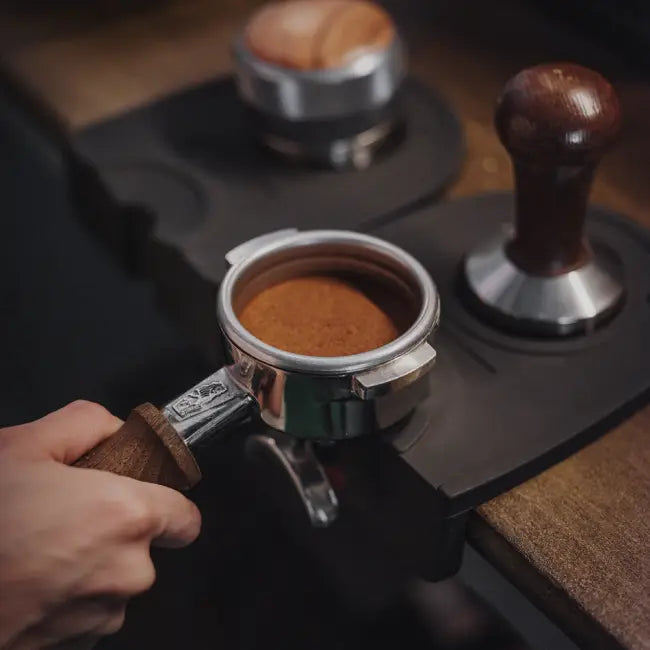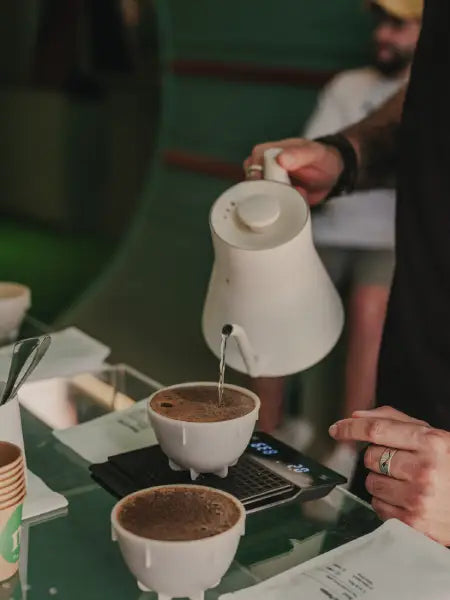Swiss Water Decaffeinated Coffee
Get to know this coffee in detail
This decaffeinated coffee, which we roast at Ineffable Coffee, has been decaffeinated using the Swiss Water osmosis method, free of solvents and chemicals.
What is decaffeinated coffee?
Decaffeinated coffee is the product resulting from subjecting coffee—any coffee—to a decaffeination process.
Caffeine is a chemical compound, an alkaloid antioxidant, found in various plants and their fruits such as coffee, tea, and guarana.
In all cases it is the same compound, but it receives a different name depending on the source and because it may be mixed with other substances specific to each plant.
Caffeine has stimulant and psychoactive properties, which is why some people prefer to consume decaffeinated beverages, such as coffee.
The decaffeination process is carried out on green coffee before roasting. Roasters purchase already decaffeinated green coffee and roast it like any other coffee, but with a profile tailored to this type of coffee.
https://www.youtube.com/watch?v=kX35uJ8TCIQ
Meet the producer
How is decaffeinated coffee obtained?
There are several methods for obtaining decaffeinated coffee. All of them are based on the same logic. First, the green coffee beans are moistened, which makes the caffeine soluble, and then it is extracted.
The decaffeinated coffee we work with at Ineffable Coffee has been treated with an osmosis method known as Swiss Water, which does not use chemicals.
What differentiates the methods is the way the caffeine is extracted. Traditionally, this has been done using a chemical solvent such as methylene chloride or ethyl acetate.
First, the coffee beans are moistened and then immersed in a solution containing one of these chemicals. Both methylene chloride and ethyl acetate bind to the caffeine molecules.
Once they have adhered, the chemicals are recaptured with an evaporator and the beans are washed. As the chemical attached to the caffeine evaporates, the caffeine evaporates as well.
But this process has two main contraindications. The first is that the use of these chemicals poses health risks. The second is that the chemicals not only bind to caffeine, but also to other coffee molecules, impairing its organoleptic qualities.
This method, known as direct solvent, can also be carried out with carbon dioxide, which is less toxic. However, it is a very expensive and time-consuming method.
The Swiss Water Method for Decaffeinated Coffee
The decaffeinated coffees we work with at Ineffable Coffee have been decaffeinated using a method known as Swiss Water.
Simply put, this process involves immersing green coffee in water containing a caffeine-free green coffee solution. This solution is obtained using this same method and is also natural and 100% chemical-free.
Coffee has many soluble compounds that, when in contact with water, create the beverage we love. The logic is that if we immerse green coffee in water already saturated with all the soluble compounds in coffee except caffeine, the water will only absorb the caffeine from the green coffee, keeping the rest of its qualities intact.
This process extracts up to 99% of the caffeine, and while some organoleptic qualities are inevitably lost along the way, the result is a coffee that remains specialty, meaning we'll still find tasting notes, such as spices, marzipan, and chocolate.
Does decaf coffee have caffeine?
According to current European Union legislation, the amount of caffeine cannot exceed 0.1% of the total dry weight for a coffee to be considered decaffeinated. This means that yes, decaffeinated coffee does contain caffeine.
But it's such a small amount that it shouldn't be a concern if you want to avoid the stimulant effects.
To make this more understandable, let's put it this way. We don't know exactly how much caffeine a cup of coffee has, since it varies depending on many factors. Typically, a cup of coffee has between 70 and 140 mg of caffeine, and a cup of decaffeinated coffee has between 1 and 7 mg.
Is decaf coffee healthy?
Yes, decaffeinated coffee using the Swiss Water method or another osmosis method is healthy. On the other hand, decaffeinated coffee using a method that uses chemicals, such as those described above, can have harmful effects.
At Ineffable Coffee we only use coffees that have been decaffeinated using the Swiss Water method.
Is decaffeinated coffee of lower quality?
Yes, the decaffeination process inevitably affects the quality of the coffee. Caffeine itself is tasteless, but by removing the caffeine, you also eliminate other molecules that can affect the aroma or flavor.
The flavor and aroma of coffee are produced by more than 400 different molecules. The least invasive process, which eliminates the fewest molecules besides caffeine, is the Swiss Water process, or osmosis water process. So far, no process has been discovered that isolates and eliminates only caffeine.
Even so, decaffeinated coffee can be specialty and quality if the coffee decaffeinated at its source is quality coffee. At Ineffable Coffee, we use specialty decaffeinated coffee. That is, coffee that exceeds 80 SCA points once the caffeine has been removed.
Why drink decaffeinated coffee?
The main reason to drink decaffeinated coffee is because we want to avoid the psychoactive effects of caffeine.
Caffeine has stimulant and diuretic effects. Sometimes we may want to avoid these effects, for example, if it's late in the day and we want to go to sleep early. Or we may be caffeine-sensitive and experience adverse effects, such as excitement, anxiety, or sweating. Even so, we don't want to skip a cup of coffee, in which case, decaffeinated coffee may be a good option.
Where to buy specialty decaffeinated coffee?
In our online coffee shop, you'll find specialty decaffeinated coffee roasted by us. Our decaffeinated coffees are decaffeinated using the Swiss Water method, so they retain almost all of their organoleptic qualities and won't harm your health.
We recommend avoiding decaffeinated coffees that have undergone a chemical process—generally the majority of commercial decaffeinated coffees—since they will be of very low quality and even harmful.
But as you can see, you don't have to give up a good cup of coffee if you want to avoid caffeine.








